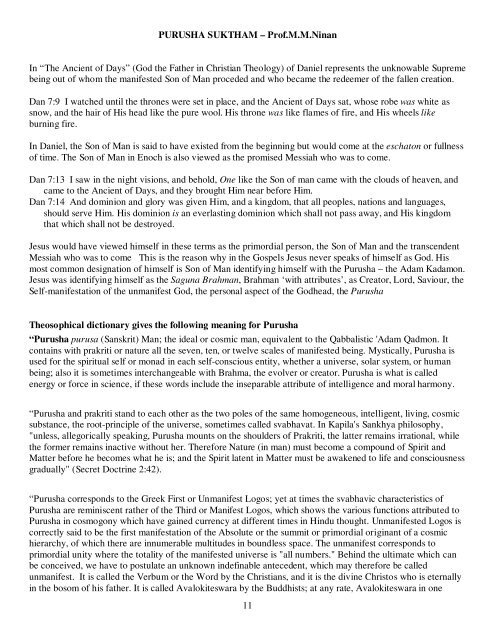Create successful ePaper yourself
Turn your PDF publications into a flip-book with our unique Google optimized e-Paper software.
PURUSHA SUKTHAM – Prof.M.M.Ninan<br />
In “The Ancient of Days” (God the Father in Christian Theology) of Daniel represents the unknowable Supreme<br />
being out of whom the manifested Son of Man proceded and who became the redeemer of the fallen creation.<br />
Dan 7:9 I watched until the thrones were set in place, and the Ancient of Days sat, whose robe was white as<br />
snow, and the hair of His head like the pure wool. His throne was like flames of fire, and His wheels like<br />
burning fire.<br />
In Daniel, the Son of Man is said to have existed from the beginning but would come at the eschaton or fullness<br />
of time. The Son of Man in Enoch is also viewed as the promised Messiah who was to come.<br />
Dan 7:13 I saw in the night visions, and behold, One like the Son of man came with the clouds of heaven, and<br />
came to the Ancient of Days, and they brought Him near before Him.<br />
Dan 7:14 And dominion and glory was given Him, and a kingdom, that all peoples, nations and languages,<br />
should serve Him. His dominion is an everlasting dominion which shall not pass away, and His kingdom<br />
that which shall not be destroyed.<br />
Jesus would have viewed himself in these terms as the primordial person, the Son of Man and the transcendent<br />
Messiah who was to come This is the reason why in the Gospels Jesus never speaks of himself as God. His<br />
most common designation of himself is Son of Man identifying himself with the <strong>Purusha</strong> – the Adam Kadamon.<br />
Jesus was identifying himself as the Saguna Brahman, Brahman ‘with attributes’, as Creator, Lord, Saviour, the<br />
Self-manifestation of the unmanifest God, the personal aspect of the Godhead, the <strong>Purusha</strong><br />
Theosophical dictionary gives the following meaning for <strong>Purusha</strong><br />
“<strong>Purusha</strong> purusa (Sanskrit) Man; the ideal or cosmic man, equivalent to the Qabbalistic 'Adam Qadmon. It<br />
contains with prakriti or nature all the seven, ten, or twelve scales of manifested being. Mystically, <strong>Purusha</strong> is<br />
used for the spiritual self or monad in each self-conscious entity, whether a universe, solar system, or human<br />
being; also it is sometimes interchangeable with Brahma, the evolver or creator. <strong>Purusha</strong> is what is called<br />
energy or force in science, if these words include the inseparable attribute of intelligence and moral harmony.<br />
“<strong>Purusha</strong> and prakriti stand to each other as the two poles of the same homogeneous, intelligent, living, cosmic<br />
substance, the root-principle of the universe, sometimes called svabhavat. In Kapila's Sankhya philosophy,<br />
"unless, allegorically speaking, <strong>Purusha</strong> mounts on the shoulders of Prakriti, the latter remains irrational, while<br />
the former remains inactive without her. Therefore Nature (in man) must become a compound of Spirit and<br />
Matter before he becomes what he is; and the Spirit latent in Matter must be awakened to life and consciousness<br />
gradually" (Secret Doctrine 2:42).<br />
“<strong>Purusha</strong> corresponds to the Greek First or Unmanifest Logos; yet at times the svabhavic characteristics of<br />
<strong>Purusha</strong> are reminiscent rather of the Third or Manifest Logos, which shows the various functions attributed to<br />
<strong>Purusha</strong> in cosmogony which have gained currency at different times in Hindu thought. Unmanifested Logos is<br />
correctly said to be the first manifestation of the Absolute or the summit or primordial originant of a cosmic<br />
hierarchy, of which there are innumerable multitudes in boundless space. The unmanifest corresponds to<br />
primordial unity where the totality of the manifested universe is "all numbers." Behind the ultimate which can<br />
be conceived, we have to postulate an unknown indefinable antecedent, which may therefore be called<br />
unmanifest. It is called the Verbum or the Word by the Christians, and it is the divine Christos who is eternally<br />
in the bosom of his father. It is called Avalokiteswara by the Buddhists; at any rate, Avalokiteswara in one<br />
11


















